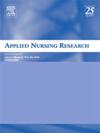The challenge of belonging: Exploring collegiality and incivility in the transition to academia for nurse clinicians
IF 2.2
4区 医学
Q1 NURSING
引用次数: 0
Abstract
Background
Registered nurses are ethically and professionally obligated to foster sustainable and respectful workplaces. However, when transitioning to academia, many nurses encounter unexpected challenges, including hierarchical and individualistic environments that contrast with the collaborative ethos of clinical practice.
Method
This qualitative study explored the experiences of 11 registered nurses from six Australian universities as they transitioned into academic roles. Participants highlighted a pervasive lack of collegiality and feelings of alienation within their institutions, impacting their integration and professional development.
Discussion
The findings reveal a significant disparity between participants' expectations of collegiality and their lived experiences. Participants reported isolation, limited mentorship, and insufficient support, which hindered their ability to navigate academic roles effectively. These outcomes underscore the need for academic institutions to adopt structured, supportive systems and cultivate a collegial culture that prioritises inclusivity and collaboration.
Conclusion
This study emphasises the importance of collegiality in fostering a sense of belonging among novice nurse academics. Academic institutions must create supportive, collegial environments that nurture new staff, promote open communication, and cultivate a sense of value and belonging. Addressing these challenges will improve transition experiences, enhance retention, and contribute to more positive academic environments.
归属的挑战:探索合作和不文明的过渡到学术界的临床护士
注册护士在道德和专业上都有义务促进可持续和尊重的工作场所。然而,当过渡到学术界时,许多护士遇到了意想不到的挑战,包括与临床实践的协作精神形成对比的等级和个人主义环境。方法本定性研究探讨了来自澳大利亚6所大学的11名注册护士向学术角色过渡的经历。与会者强调,他们的机构普遍缺乏合作和疏离感,影响了他们的融入和专业发展。研究结果显示,参与者对团队合作的期望与他们的生活经历之间存在显著差异。参与者报告孤立、有限的指导和不足的支持,阻碍了他们有效地驾驭学术角色的能力。这些成果强调,学术机构需要采用结构化的、支持性的系统,并培养一种优先考虑包容和合作的大学文化。结论本研究强调了团队合作在培养新护士学者归属感中的重要性。学术机构必须创造支持性的、学院式的环境,培养新员工,促进开放的交流,培养价值观和归属感。解决这些挑战将改善过渡体验,提高保留率,并有助于建立更积极的学术环境。
本文章由计算机程序翻译,如有差异,请以英文原文为准。
求助全文
约1分钟内获得全文
求助全文
来源期刊

Applied Nursing Research
医学-护理
CiteScore
4.50
自引率
0.00%
发文量
65
审稿时长
70 days
期刊介绍:
Applied Nursing Research presents original, peer-reviewed research findings clearly and directly for clinical applications in all nursing specialties. Regular features include "Ask the Experts," research briefs, clinical methods, book reviews, news and announcements, and an editorial section. Applied Nursing Research covers such areas as pain management, patient education, discharge planning, nursing diagnosis, job stress in nursing, nursing influence on length of hospital stay, and nurse/physician collaboration.
 求助内容:
求助内容: 应助结果提醒方式:
应助结果提醒方式:


